By Katie Moritz | Rewire
At only 22, fresh out of undergrad, Stewart Van Cleve started a project that would change the trajectory of his life.
He began collecting stories—stories of the lesbian, gay, bisexual, transgender and queer people of his home state of Minnesota.
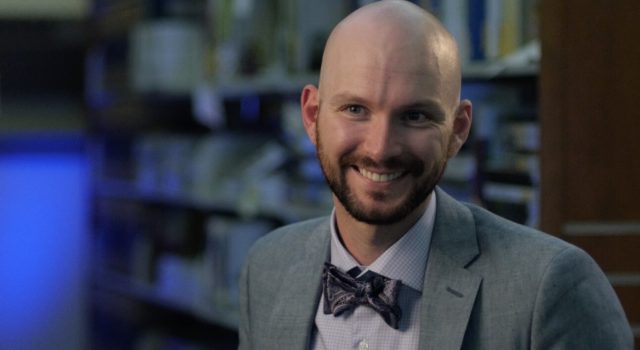
Those stories snowballed into something more. Today, at 29, Van Cleve has built a career around his passion for LGBTQ history. That research he started in his early 20s was eventually published as a book, “Land of 10,000 Loves,” a gorgeous, illustrated portrait of Minnesota’s queer history.
For Van Cleve, “Land of 10,000 Loves,” and all his work around queer history, is truly a labor of love.
“I was also in grad school when it got published, so on top of being a grad student full-time, and working, I was writing this book and doing that work as well,” he said to Rewire. “I didn’t sleep very much while I was working on it.”
Now a full-time librarian and assistant professor at a Minnesota university, Van Cleve has since taken his passion project to the streets. He gives walking tours of St. Paul and Minneapolis, with the aim of exposing the hidden queer history of the places locals pass every day.
“The thing about those kinds of tours, especially in Minneapolis, is that you’re staring at a lot of parking lots, because all that stuff has been demolished,” Van Cleve said. “But I think for so many people, even though they’re not actually seeing the building… still just being able to see a place, and say, ‘Oscar Wilde was in this spot,’ or ‘Josephine Baker danced at this spot,’ or ‘people hid in the back of bars in secrecy at this spot,’ really resonates with them in a way, I don’t think, that a book could do in quite the same way.”
Van Cleve and his work are featured in “Out North,” an upcoming documentary on Minnesota’s LGBTQ history produced by Twin Cities PBS.
Rewire sat down with Van Cleve to talk about the joys and realities of turning a passion into a side hustle.
Rewire: Why do all people need to know LGBTQ history?
Stewart Van Cleve: The purpose of all this work is really to help educate folks about the LGBTQ+ community. I do think that since we do not receive that kind of education in middle school, or in high school, a lot of folks have lived their whole lives without really having any kind of understanding, in-depth understanding, of LGBTQ+ issues and histories. And it’s such a rich and fascinating lens into Minnesota, in Minnesota history, that tells us not only about Minnesota history, but also about LGBTQ, and then American history as a whole, and across the entire country.
I started working with the (Jean-Nickolaus) Tretter Collection (a Minnesota LGBTQ history archive) as a volunteer (as an undergraduate), and worked my way up over several years, and what continued to astound me was how much I didn’t know. Even though I had lived here for a long time, since I was a kid, I just didn’t know all this crucial information about these communities, and how they have worked so hard for so long to try to improve the lives of LGBTQ+ folks in the community.
Rewire: What’s the benefit of telling these local stories, rather than focusing on the history of queer hubs like New York City or Los Angeles?
SVC: When you do local history, it helps people connect the experiences of folks who are different from them to their own experiences. So if I can say to somebody, “Do you remember shopping at the Emporium department store?” Especially local St. Paul people will be like, “Yeah, of course I remember that.” And then you can say, “Well, were you aware that gay men were using the Emporium department store for these kinds of exciting purposes?” No idea! Absolutely no idea.
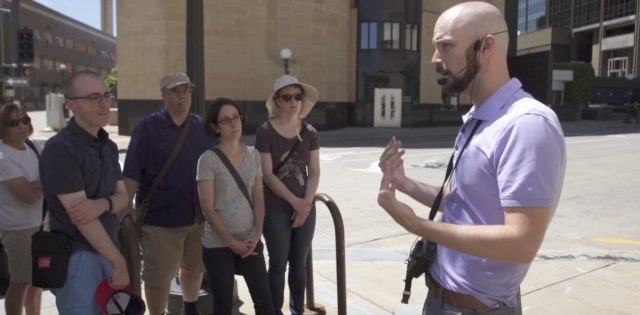
I also will say, there’s a story in (1940s gay memoir) “The Evening Crowd at Kirmser’s” by Ricardo J. Brown, who talks about this butch woman who he knew from visiting the bar. (At that time) butch women always wore pants and flannel shirts, and dressed in a particular way. Never wore dresses.
And one day he ascends the escalator (of a department store) and sees Ruth with her mother, and she’s wearing a dress, and makeup, and lipstick. And it’s clear that the mother has cajoled her into doing this. It was a horrifying moment for both of them, both Ricardo J. Brown as well as Ruth. Just the sheer despair, I think, that some LGBTQ+ folks experience, in these spaces that other folks see as these kinds of nostalgic wonderlands of yesteryear. And to say that the experience that you have is going to be dramatically different than these LGBTQ+ experiences, even though they are happening in the exact same place.
And I think that you can’t do that if you’re writing about Stonewall every single time. You can’t do that if you’re writing about West Hollywood, or the Castro. It doesn’t connect as well as you can if you said, “This happened where you used to go. You used to be in these kinds of spaces. You used to pass these places right by.”
Rewire: Why is local queer history often overlooked?
SVC: I often say that LGBTQ+ local history is… actually in a really queer place within history, and within local history. Because it can be, I think, sometimes too local for LGBTQ+ historians who are focusing on these national trends. And it can be a little too queer for the local history folks. And so sometimes you find yourself in these weird places, trying to bridge that gap between these two kinds of groups.
Rewire: How does your day job as a librarian complement your passion project?
SVC: I’ve found that people all access this kind of information differently, so some people respond better to these kinds of tours. Some people respond better to books. And so really trying to reach everybody where they’re at is really what I’ve been trying to do. And that’s also, in no small part, my training as a librarian. That’s one of the key things that we do in that profession, is meeting people where they are, trying to get them the information that they need. So I’ve really applied that as well to the work that I’ve been doing.
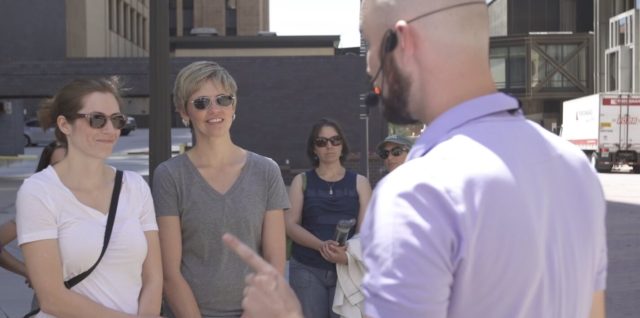
And so going forward, that’s really where I see this shaping up in the future, is now that I’ve had this training as a librarian, to really start focusing on connecting people to the resources. And that could be print resources, of course, but that’s also oral histories, so connecting people with the folks that actually lived it, and understood it, and were there.
Rewire: I would imagine that a history side-hustle would be harder to translate into a full-time gig than other side-hustles are. Is that something you’re working toward?
SVC: It would certainly be a dream that I would have, to have a full-time, permanent position dedicated to this kind of work. Right now, and I’m happy to do it, and I understand that a lot of institutions are trying to do this kind of outreach to these communities, and some of them have not done so in the past. And so that’s kind of the dream. I do realize that that might not be possible. It’s a pretty rare kind of a position, that would be a new thing that somebody would have to do.
In the meantime, there’s this need. And I’m one of the very few people in the region who can meet that need. And so, to me, I do think that it’s been such a privilege to really be able to write a book.
And so I partly think it’s my responsibility to do whatever I can, now that I have all of this knowledge, and I have the opportunity to have that time to be able to do that research, connect with those people, to build that kind of infrastructure that you need to have in order to really understand these communities, which are so diverse, and the experiences that they had. When people ask me to help, in some way, I will usually say yes. I’ll just say, “Sure, I’ll help.”
At the same time, we’re getting to this point now where I’m seeing myself more in a kind of advisory role. And to help these institutions also do it themselves, so that it’s not just me as the LGBTQ+ history person doing that. To try to work with them to do it themselves.
Rewire: Writing your book kind of took you off-track of your original career plan. Can you talk about that?
SVC: Urban studies was my undergraduate degree. And then my first master’s is urban studies. And then I actually, at that time, after publishing “10,000 Loves,” I was going to be finished with (my LGBTQ history work). And I was going to be an urban planner. That was the dream.
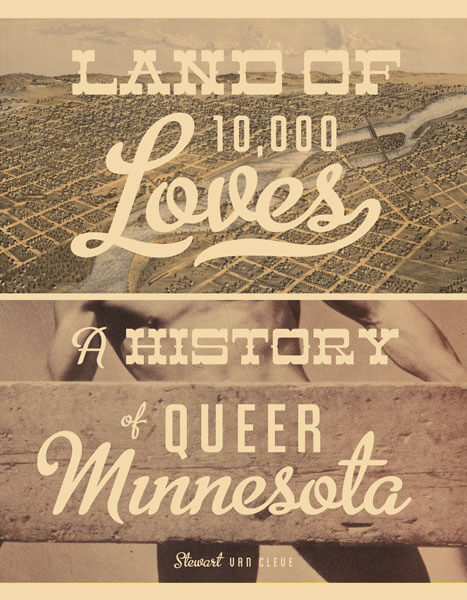
But while I was working on my (master’s) thesis, I kept running across the idea of gentrification, and particularly the roles people imagine that gay men and lesbians play in gentrification. And that led me to do a historical study of the anti-gay counter-movement in the late 1970s. So I found myself right back there again, and really, while I was doing that research, I discovered It was obviously something that I’m still incredibly passionate about. And it’s something that I’ve invested so much in already.
I was doing research in the library all the time, and was talking with a librarian, who said, “You know, if you become a librarian, you could just do this all the time. This could just be what you do.” It was kind of like a lightbulb kind of moment.
And so now, I joke with my family that I’m going to go get a Ph.D., and they tell me that they’re going to commit me if I do that. So I’m done with school.
Rewire: Obviously you have this passion for LGBTQ history, but you also have this entrepreneurial spirit that has helped you get all this done. What’s your advice for someone who wants to turn their passion into a career?
SVC: The work that I’ve done happened because so many people helped me do it, but it is absolutely also a consequence of my persistence. It is a consequence of my dedication to LGBTQ+ history.
And there were many times where I started doing this work without permission. And sometimes really caused some strain within the institutions that I was working with in order to make this kind of work happen. Because nobody had done it before, and in the end, I think everybody has been really supportive, and I really appreciate all that support.
But in order to do this kind of work, especially when you are the person who is doing some of this first, initial work, you have to be ready to really dedicate a substantial portion of your time in order to do it, and you will not get paid for it. That’s the other crucial piece of information.
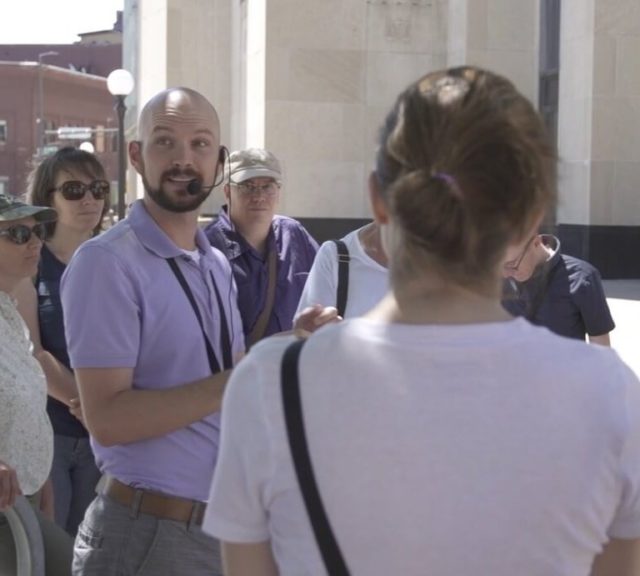
Rewire: How did you keep paying the bills when you weren’t getting paid for your work?
SVC: In order to sustain this kind of work, I’ve moved, I think now, nine or 10 times in less than that amount of years. Back and forth, all over the place, chasing jobs, doing whatever I needed to do to make sure that I could take care of myself while I was doing this work. When I was writing “10,000 Loves,” that was at least a 10-hour-a-day endeavor (on top of my day job).
And it also just takes 10 years. It’s 10 years of building networks, finding the right people. I think I’ve actually gotten more and more, I don’t know what a different word for “brave” would be, but… Tenacious. I think “tenacious” is a good one. You really have to put yourself out there, and not be afraid of people questioning whether or not you’re qualified to do it, because that certainly happened to me while I was doing this work, before I had the master’s degrees. Before the book was actually published.
Some folks did have these kinds of questions: “Are you sure that you’re the right person to do this? Are you sure that you’re qualified to do this?” And the answer was, “Well, I’m making myself qualified to do it. Right now. That’s what this is.” And I think that’s something that really is kind of a more entrepreneurial side of this work that I’ve done, is really striking out, often without a safety net, without clear instructions on how to do it, and really trying to figure it out as I went.
![]() This article originally appeared on Rewire
This article originally appeared on Rewire
© Twin Cities Public Television - 2017. All rights reserved.
Read Next




